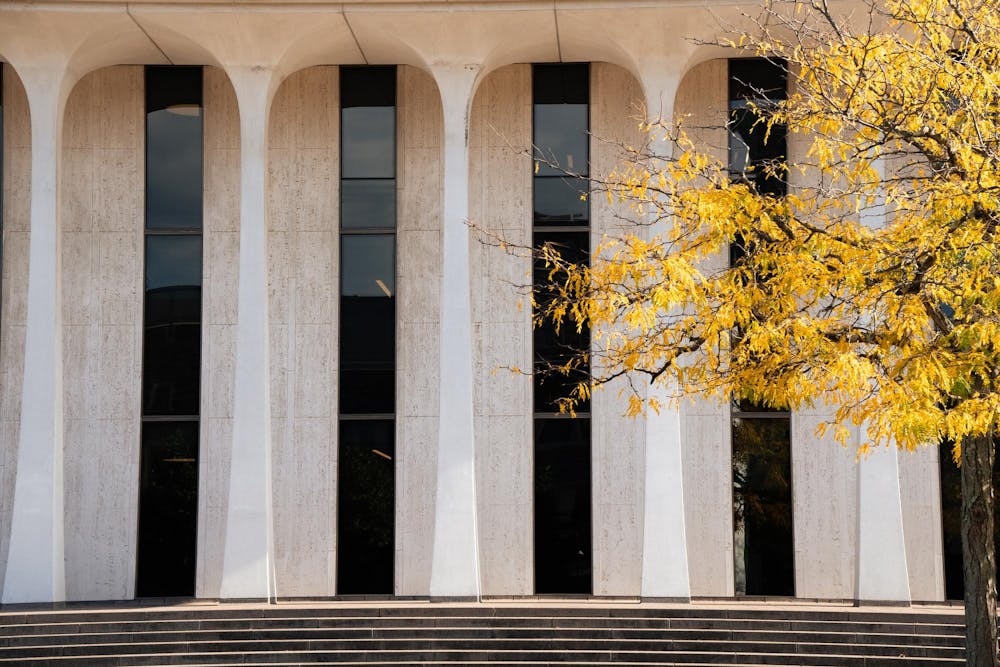The Undergraduate Student Government (USG) Senate met on Sunday to hear from the Department of Public Safety (PSAFE), continuing a series of administration-adjacent presentations to the body. The PSAFE presentation, led by Public Safety Associate Director of Administration Bryant Blount ’08 and Community Relations Lieutenant Sean Ryder, explained aspects of their role in student safety and law enforcement, including their surveillance uses of the eduroam wireless network and cameras in investigations.
“We have to utilize what tools are available to us to identify people, particularly if we’re concerned for their wellbeing. That’s always going to trump everything,” Ryder said in response to a question about whether PSAFE accesses students’ eduroam history during investigations. “In terms of whether or not we have access to networks for investigations, without going into specifics… there may be times when we can seek access to those. But it’s not as straightforward as logging on and starting looking. We have to go through a series of permissions,” Ryder added.
Blount and Ryder also addressed several frequently asked questions related to privacy protections, camera functionality, and governance. Regarding privacy, Blount explained that PSAFE uses multiple layers of review for camera placements, saying it ensures that cameras do not intrude on private spaces and that face-blurring technology is used where appropriate. He added that dorm cameras are not live-monitored and are only used for post-incident review.
The University faced criticism from students in 2023 after installing cameras inside of residential entryways, despite earlier University statements suggesting that installation would take place on building exteriors.
Blount and Ryder also outlined key updates from the PSAFE team, including the expansion of staffing from 106 to 160 employees due to the construction of new buildings like the art museum. Blount, who gave the figure, did not specify when the staffing expansion took place. The campus has undergone a construction boom since the post-pandemic return to campus.
On the topic of governance, Blount clarified that decisions about camera placements and other operational matters go through the Life Safety and Security Committee before implementation, which he said ensures transparency and accountability in PSAFE’s actions. The committee is comprised, according to Blout, of departments including “facilities, environmental health and safety, risk management” but The Daily Princetonian was unable to verify what offices belong to the committee. Ryder also spoke about the trainings PSAFE officers undergo to recognize and support students facing mental health challenges.
“Our officers are expected to complete training. It’s reviewed and they have them completed every year, and that will qualify them to at least have some knowledge in terms of how to best handle somebody that’s going through some kind of crisis once the officer identified that person and located them,” he said. He did not specify in the session what training tool is utilized by the department, but did say it was a “New Jersey Attorney General mandated” training.
Blount also discussed PSAFE’s focus on community relations, noting their efforts to actively seek feedback from students through informal events such as ice cream socials and discussions at residential college gatherings.

“We want you to be comfortable with us, tell us when we’re getting it right. Particularly when we’re not,” Ryder said.
In response to student inquiries about the University’s conduct process, Blount reminded the Senate that PSAFE’s role is separate from the University’s internal disciplinary procedures.
“The University student conduct process is actually separate, distinct from law enforcement,” he said. “But students, again, all University members, are expected to be honest and straightforward in University processes.”
The Senate then discussed its upcoming annual report, which will provide a comprehensive recap of USG’s work over the past year. The report, which is due on Jan. 8, will include updates from each committee and working group, as well as a summary of key initiatives and a list of members. The annual report serves as a tool for keeping constituents and other stakeholders informed about the USG’s activities and priorities.

USG meetings are open for all students to attend and are held on Sundays from 5–6 p.m. in Robertson Hall 016. The next USG Senate meeting on Dec. 1 will be held virtually, following the upcoming USG election.
Alena Zhang is a staff News writer for the ‘Prince.’
Please send any corrections to corrections[at]dailyprincetonian.com.








